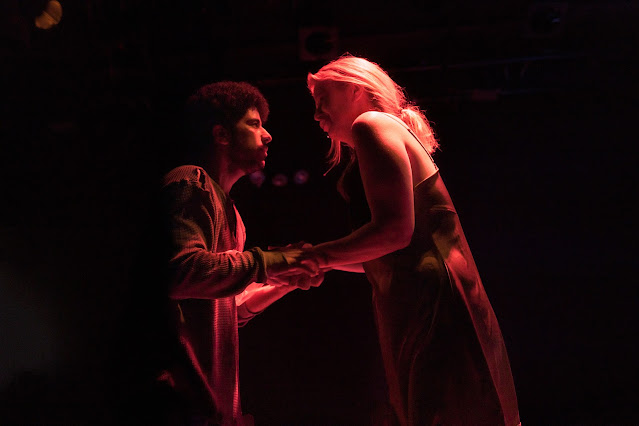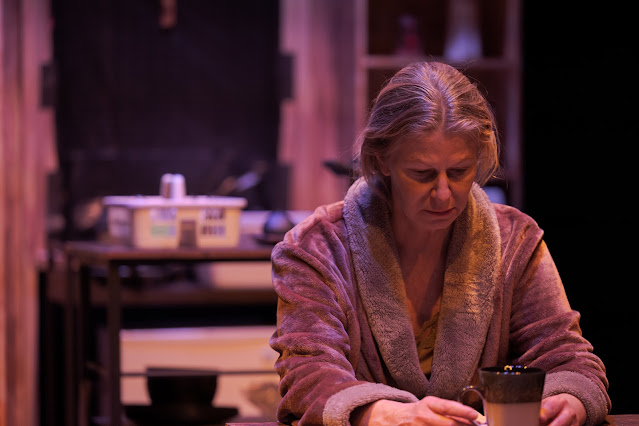Bloom
Written by Marco Antonio Rodriguez
Directed by Victoria Pérez
64 East 4th Street, Manhattan, NYC
April 16-May 8, 2022
 |
| Rafael Beato and Monica Steuer. Photo by Andres Bohorquez. |
The program for Bloom, the new play from Marco Antonio Rodriguez, notes its setting as a "not so distant future," and indeed, the government-sponsored oppression of queer individuals that it depicts, while inspired by conditions in Chechnya, seems increasingly less distant in the United States–the latest example being the governor of Florida, calculating the political capital to be worth the risk of economic damage, punishing (or making a show of attempting to punish) a corporation for reluctantly releasing a statement against the state's "don't say gay" bill. Bloom, which includes "excerpts . . . taken from actual narrations of tortured LGBTQ+ youth," is making its U.S. premiere at IATI Theater, a Latinx company dedicated to showcasing diverse and unique voices. The cauldron of surveillance, scarcity, and (state) violence in which the play's mother and her queer, male-presenting child exist recalls life under a communist dictatorship in a Václav Havel play, and this repressive atmosphere drives the raw reckoning with one another into which the pair is forced.
 |
| Rafael Beato and Monica Steuer. Photo by Andres Bohorquez. |
When the play opens, Roan (Rafael Beato) has been returned to the home where he lives with his mother, Julia (Monica Steuer), after having been informed on, imprisoned, and tortured (the make-up showing the effects of this, designed by Barbara Kent, looks painfully realistic) for being queer. Now, Julia estimates that he has an hour left before he is taken away for execution. This pressure-cooker situation pushes Roan and Julia to share more over the course of the play than the anger and blame which they trade at its beginning. Julia, bolstered by her religiosity and that of her neighbors, views queerness as akin to a chosen sickness. Meanwhile (and a testament to the strength of Beato's performance), Roan's entire demeanor and carriage changes when he talks about the love and belonging that he has found in a pansexual community. Particularly in the play's first half, the lulls that surface in the sustained intensity of Roan and Julia's exchanges resemble eyes in the storm of mother and child coming to terms with–and coming better to know–one another. |
| Rafael Beato. Photo by Andres Bohorquez |
As the pair excavate the past and probe the present, we gain a deeper sense of the bonds that wind through the resentments and struggles within this two-person household. We can also discern some parallels between some of what Julia has had to endure as a woman and Roan's persecution, both aspects of enforced heteronormativity. One discussion makes it quite clear that Julia too is a sexual being, underscoring the hypocrisy of her demonizing others' expressions of love and desire. A sequence in which Roan acts out a melodramatic story that he wrote as a 12-year-old provides an extended break from the tension that saturates most of the characters' hour together, as well as a chance for Beato to embody a very different, playful side of Roan. Roan has named one of the characters in his story Amaranta, which he explains comes from "amaranth," a plant the different flowers of which, he says in a link to the pattern of symbolism tied to the play's title, means that it can't be reduced to only one thing.
 |
| Monica Steuer. Photo by Andres Bohorquez. |
The rectangular set sits between two banks of seats, giving it the effect of a railroad apartment (with an ominous number of locks on the door), fitting for the impoverished conditions in which the characters live. The compelling rhythms of the naturalistic dialogue find powerful expression in the wrenching, tender, lived-in performances by both Beato and Steuer. This Bloom will take deep root in your memory.
-John R. ZIegler and Leah Richards







Comments
Post a Comment